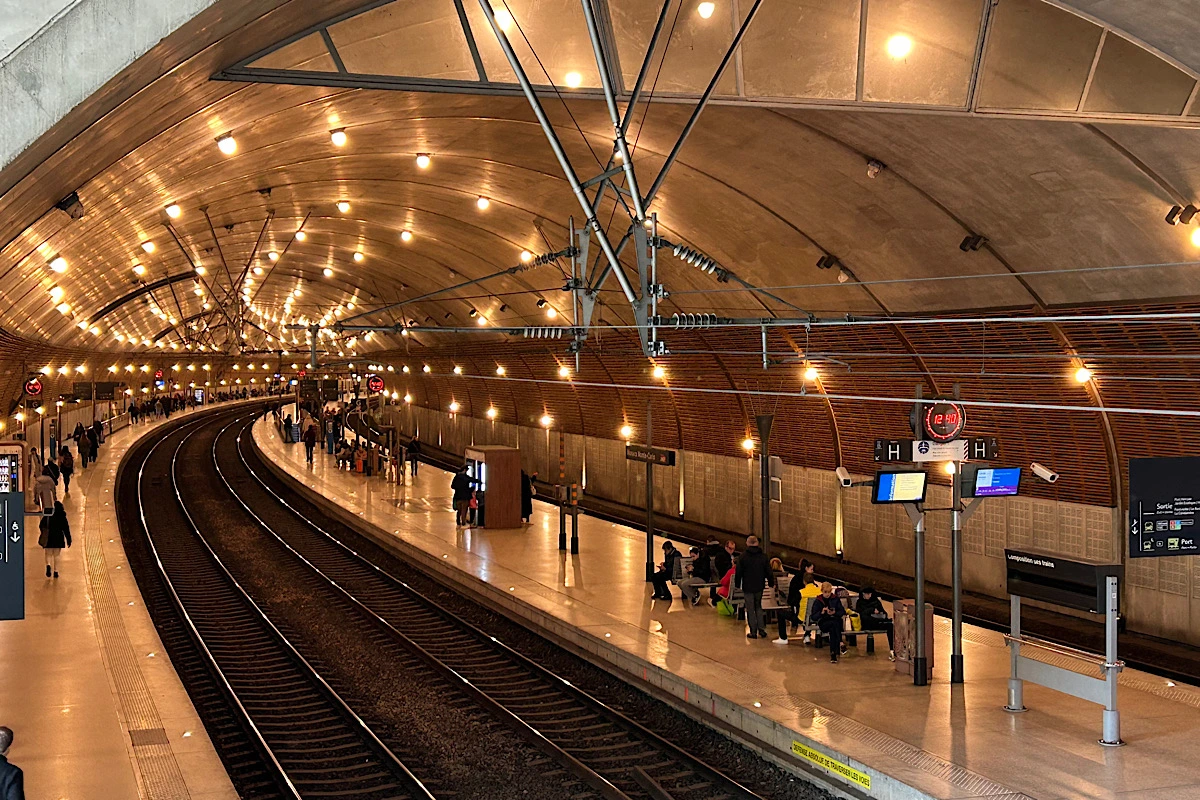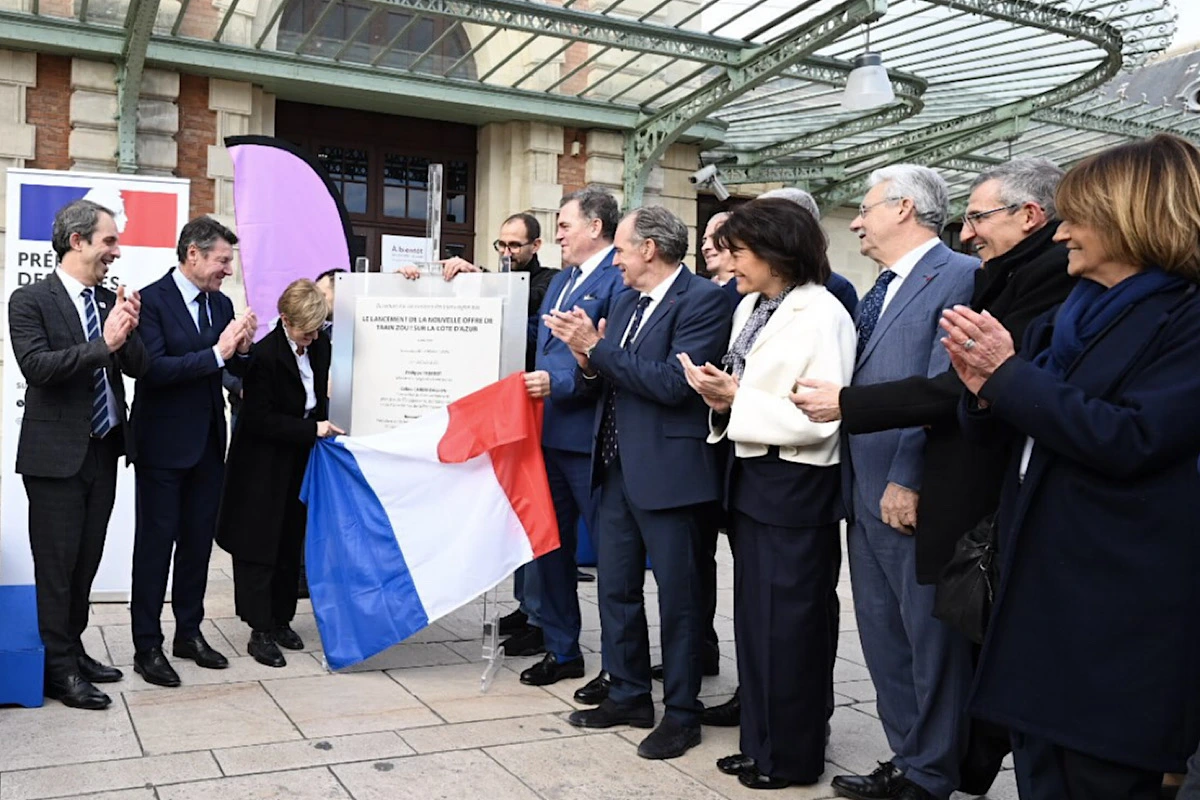The Côte d’Azur has entered a new era of rail travel. A train now runs every 15 minutes along the coast – including on weekends – and punctuality is already up to 97% barely two months after the first train under the SNCF Voyageurs Sud Azur subsidiary got on the rails.
On 14th February, just under two months on from the launch of the new and improved SNCF Voyageurs Sud Azur service, officials from France and Monaco gathered at the central Nice-Ville train station to celebrate a new age of train travel in the region.
SNCF Voyageurs Sud Azur is a competitive subsidiary of SNCF Voyages that was selected by the Provence-Alpes-Côte d’Azur Region as part of the tender for the coastal sector of the regional train network. It has a 10-year contract to operate the Les Arcs–Ventimiglia, Cannes–Grasse and Nice–Tende routes, and has already brought in sweeping changes to improve the passenger experience and regional mobility on the second busiest network in France.
Since 15th December, a train has run in both directions between Cannes and Menton every 15 minutes, seven days a week. The schedule has been further expanded, with these trains in service until 10pm on weekdays and until 2am on weekends.
See more: Trains now running every 15 minutes along the Côte d’Azur
As part of a €226 million investment into the service, 22 trains have been modernised too, and various stations along the route are benefiting from renovations and upgrades that will allow them to better manage the growing number of passengers.
Céline Caron-Dagioni, Minister of Equipment, Environment and Urban Planning, represented the Principality at the official launch of the service last week and spoke about the evolving role of train travel in Monaco, which has seen passenger numbers grow by a massive 60% in the last decade. Indeed, in 2024, nine million passengers passed through the Gare de Monaco Monte-Carlo.

“We have demanded clear commitments, and we will ensure they are upheld,” said Caron-Dagioni of Monaco’s demands for a more regular and reliable service. “We will analyse schedules, the frequency of delays and the availability of double trains at peak hours… The Principality remains committed to developing the TER network for commuters and visitors alike, while working closely with French authorities to ensure the future of regional mobility.”
And it is fair to say that the initial results look good. Renaud Muselier, the president of the PACA region, has reported a 10% rise in ridership and a 97% punctuality rate since the new SNCF Voyageurs Sud Azur-run service began operating at the end of last year, a strong indicator that the network is already improving its reliability rates. In 2023, TER trains on the Côte d’Azur ranked last in all of France for punctuality.
Furthermore, regional authorities have promised to increase security measures on all public transport, and Nice Mayor Christian Estrosi has confirmed that there will be a 34% boost to security and ticket inspection staff numbers across the metropolitan network under the new service.
Cross-border cooperation
In related news, earlier this month, Monaco’s acting Minister of State Isabelle Berro-Amadeï attended a meeting of the French-Italian Border Cooperation Committee alongside high-level officials from both nations, including Jean-Noël Barrot, France’s Minister for Europe and Foreign Affairs, and Antonio Tajani, Italy’s own Minister of Foreign Affairs and International Cooperation.

Established under the 2021 Quirinal Treaty with the goal of better addressing cross-border issues such as education and healthcare, the Committee this time focused on the environment and transport networks, including rail travel. The Monaco contingent was invited to participate as an observer state due to its proximity to the area covered by the treaty and the Principality’s keen involvement in an array of projects in the region.
The reopening of the Tende tunnel, scheduled for June, was high on the agenda at the recent talks, as was the Fréjus Railway that runs between Turin and Modane. The latter route was closed following a major landslide in August 2023. The talks also covered ongoing improvements and renovations to the Nice-Ventimiglia line.
Other topics on the meeting’s agenda included sustainable water management in the Roya Valley, a key resource for the Principality, the development of bilingual schools in Menton and Ventimiglia, and the Corsica-Sardinia ferry link.
Read related:
Ventimiglia welcomes future international school with site visit to ‘Borgo del Forte Campus’ project
Monaco Life is produced by real multi-media journalists writing original content. See more in our free newsletter, follow our Podcasts on Spotify, and check us out on Threads, Facebook, Instagram, LinkedIn and Tik Tok.
Main photo credit: Regis Cintas-Flores
